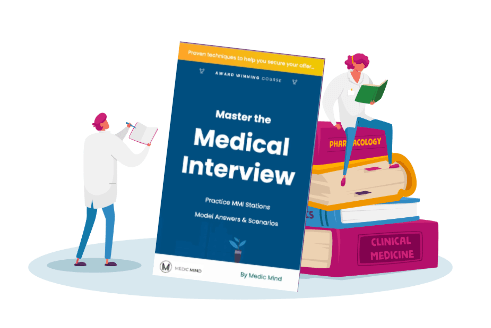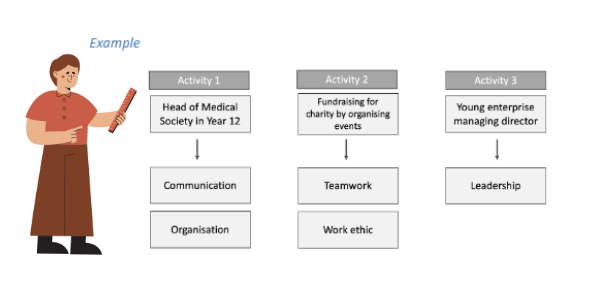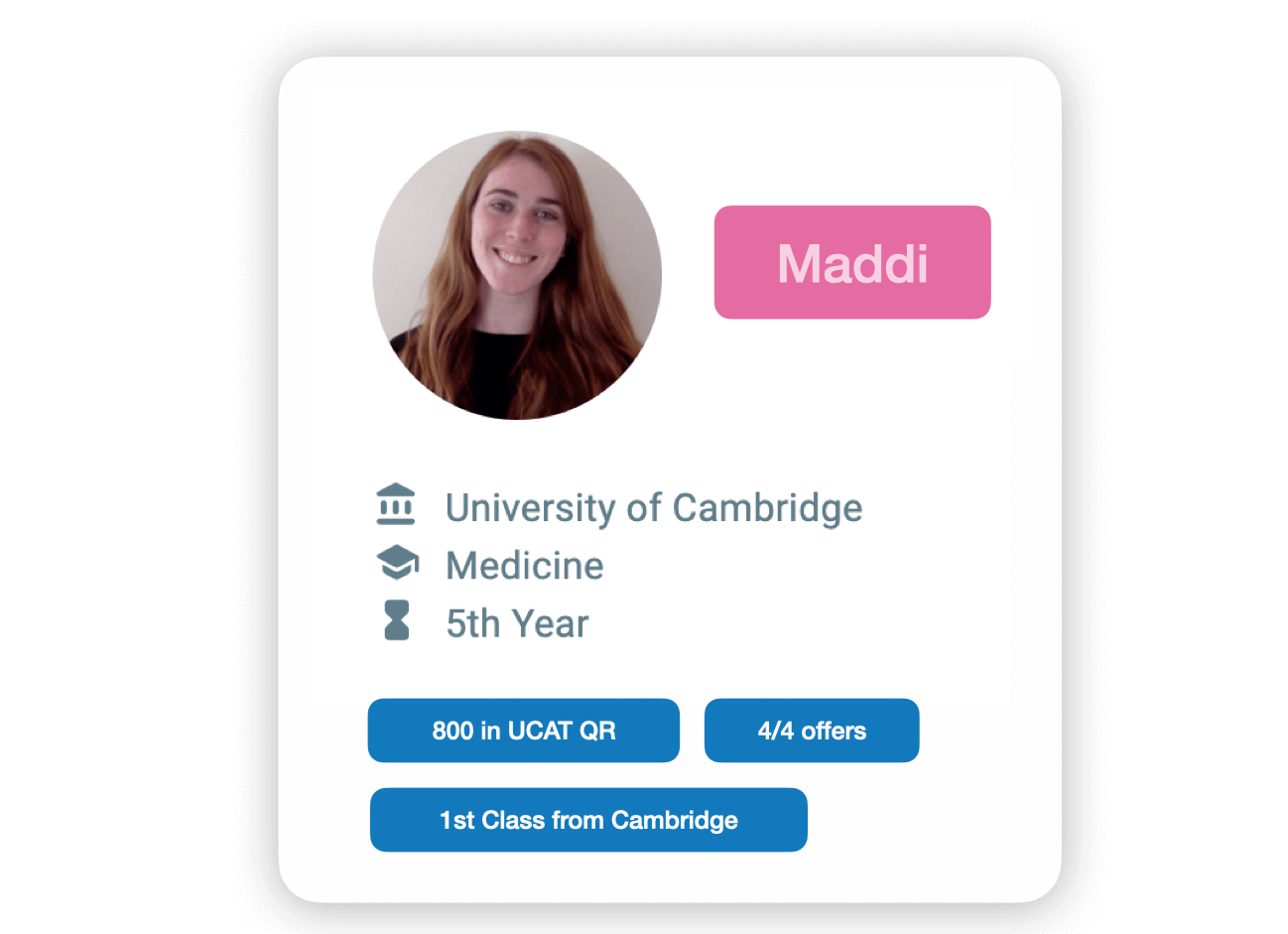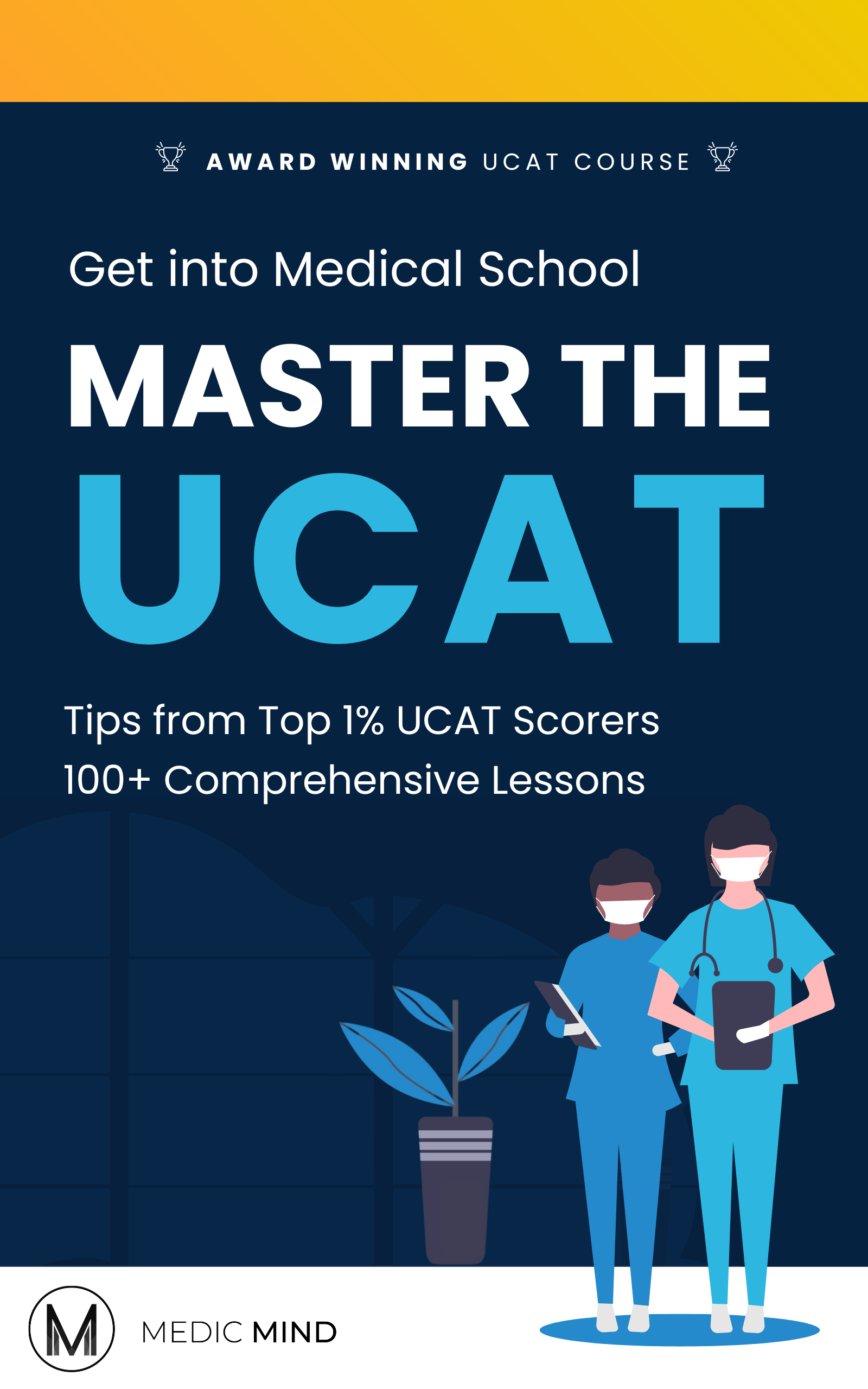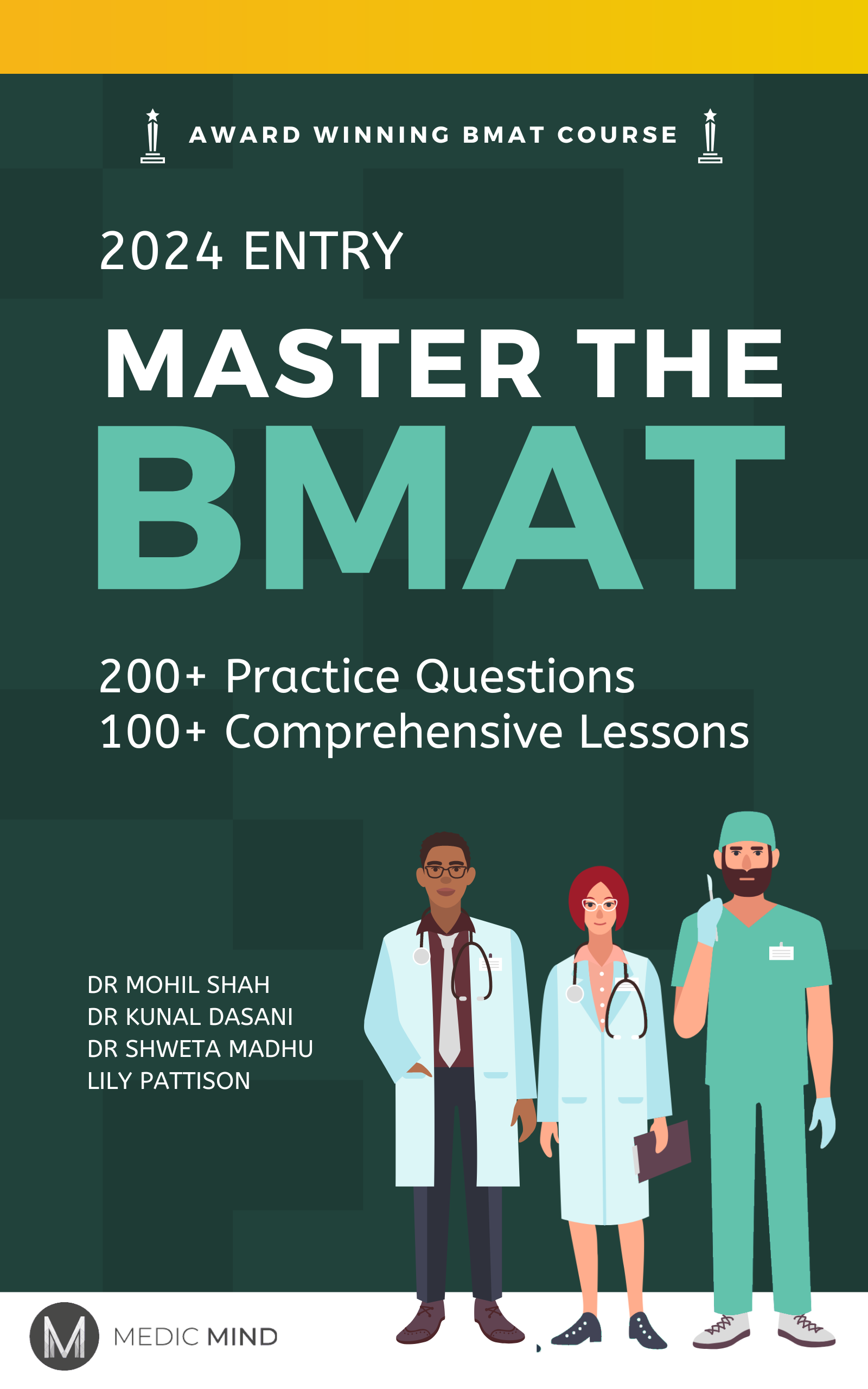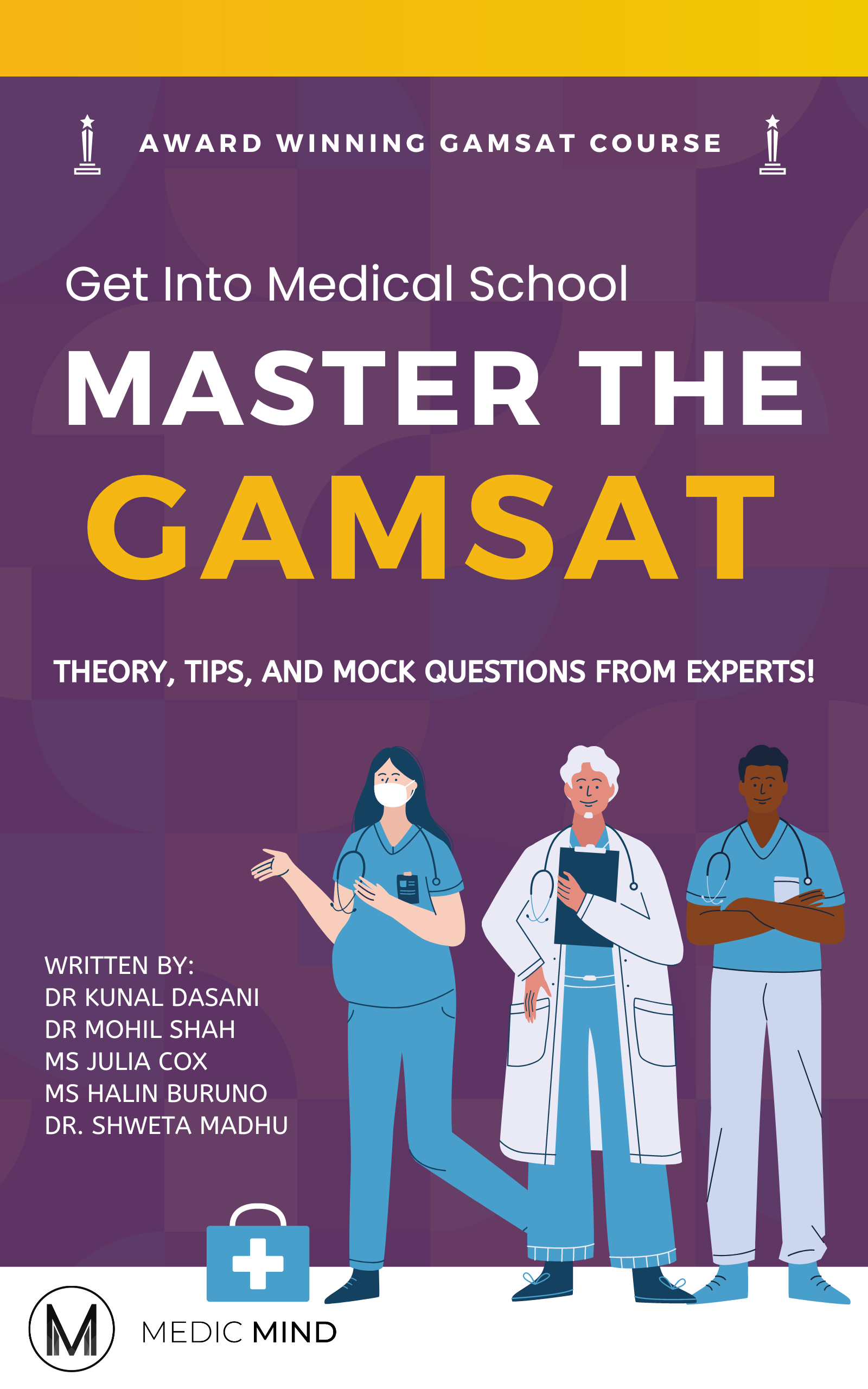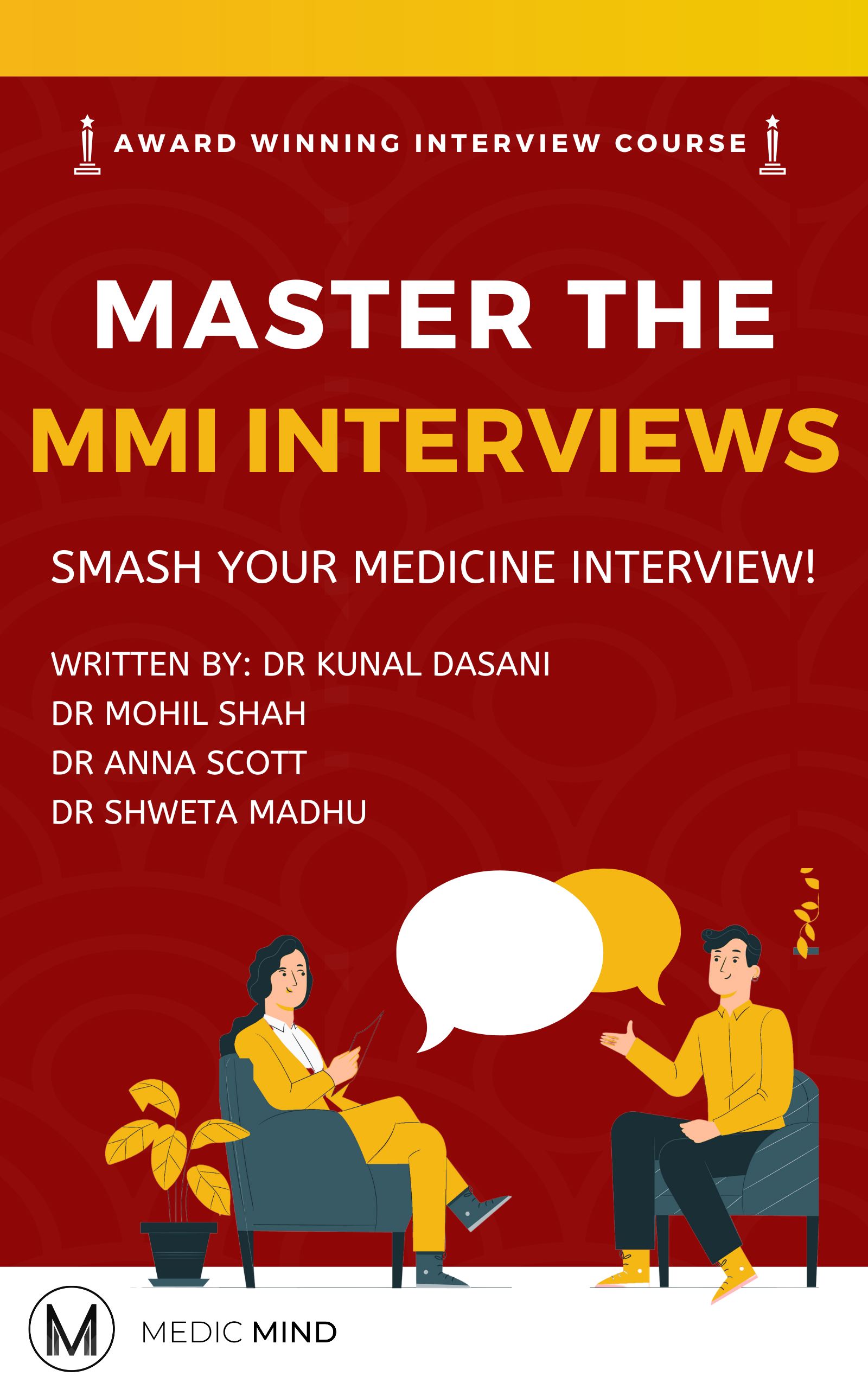
Ultimate Medicine Interview Book
- 🎓 Medicine Interview Preparation Guide
- 😊 Up to Date For 2022/23 Medicine Interviews
- 😍Written by Ex-Panellists
- 😱 100+ MMI Stations
- 🙃 200+ Medicine Interview Practice Questions
- 😉 Seal Your Offer at the Final Stage of Application!
Master the MMI Medical Interviews: Smash your Medicine Interview and get into Medical School
“Master the Medical Interviews” has been written by Medic Mind’s experts! This book contains detailed information on topics such as medical ethics, the NHS, motivation for medicine and more. This is the only book available with over 100+ MMI stations with detailed answers. By using this book you’ll be able to smash your medicine interview whether it is a panel or MMI.
Contents:
✓ 100+ MMI Stations
✓ Up to date for 2024/5 entry
✓ Detailed Tips for each Medical School
✓ 200+ Practice Questions
Ace your
Medicine Interview
- #1 Medicine Interview Preparation Guide
- Up to Date For 2022/23 Medicine Interviews
- Medicine Interview Preparation
- Written by Ex-Panellists
- 100+ MMI Stations
- 200+ Medicine Interview Practice Questions
Written by Ex-Panellists
Award-winning resources
Up to Date For 2022/23 Medicine Interviews
Talk to us
within 21 seconds
The greatest moment to begin your tutoring adventure is today! Speak with our tutors if you have any questions!
How our Medicine Interview
Book works
With medicine interviews moving online in 2022/23 and oversubscription of places in 2021/22, getting into medicine is more competitive than ever. You don't need generic practice; you need support that is completely personalised and tailored to you.

How Medic Mind’s Medicine Interview Book Works
Our students love us, but don’t
just take our word for it:
Great investment! I loved the mock MMI stations and the example answers really helped me to prepare for my interview
Great tips and advice in this book. I found the stations on hot topics really useful.
Very well-written and packed with lots of tips and practice questions!
I’m so glad I bought this book. It really helped me feel confident for my interviews.
Great book! It was divided into different sections and the tips were really useful, especially when practising the questions.
I book 1-1 interview tutoring and bought the interview book. I found that the two really complemented each other and my tutor added to the practice questions.
A really useful book for interview preparation – would recommend it to anyone with a medical interview coming up!
Thanks Medic Mind! This book was really comprehensive and it really was packed with tips that were so useful when I was preparing for my interview.
I found the mock stations really useful – I practised my response to the questions and then looked at the model answers to see where I could add information.
Brilliant book with so many tips and advice. It really helped me to think about how to structure my answers to different interview questions.
We cover every Medicine Interview Key Topic in the Medicine Interview Book
Beginner’s Guide
A group of doctors and medical students put together this book to make interview preparation easier and more accessible for students all over the world, regardless of academic background.
Tutorials
Lesson 1
Types of Interview
This chapter will fo through the style of interviews that varies considerably between medical schools.

Lesson 2
Preparing for Your Interview
This chapter will go through all the preparations you need to make fore your medicine interview.

Lesson 3
How to Use This Book

Motivation for Medicine
This chapter will address the commonly asked interview question, “Why Medicine?” This is a favourite of MMI universities, and you will frequently be interviewed for several minutes on this single question! Other topics covered include specialties, important roles of a doctor, and the multidisciplinary team.
Tutorials
Lesson 1
Why Medicine
In this chapter, we’ll look at some of the reasons you’re applying to medical school and how to respond. We will also go over sample answers and come up with one that is perfect for your interview handbook.

Lesson 2
Realities of Becoming a Doctor
Being a doctor is difficult, and medical schools want to ensure you have a thorough understanding of the profession. In this chapter, we will look at some of the benefits and drawbacks of being a doctor, as well as how you can demonstrate that you are well-versed in the field.

Lesson 3
Roles of a Doctor
Being a doctor in the 21st century is more than just diagnosing illnesses and prescribing treatments.In this chapter we will explore medical career which is multi-faceted with multiple opportunities available to doctors outside of the clinical environment

Lesson 4
GPs, Surgeons and Hospital Doctors
You may be asked where you want to specialise in the future; if you don’t know, that’s fine! However, it is critical to be aware of the various specialties in medicine and to discuss the specialties in which you have worked.
Lesson 5
Other Healthcare Professionals
Being a doctor entails far more than simply dispensing medication to patients. In this chapter, we will look at some of the non-clinical roles available here, such as teaching. These could be some of the reasons you’re interested in medical school.

Lesson 6
Extracurricular Activities
In this section, we’ll go over how to incorporate extracurricular activities into your answers about why you want to be a doctor.

Lesson 7
Practice Questions
In this chapter, we will go through medicine interview practice questions!

Work Experience
You will almost certainly be assigned to an MMI station that focuses on work experience, and you must be able to draw on your experience and go beyond what you have already written on your personal statement. This is why in this chapter we pay special attention to what you’ve written in your personal statement and make sure we’ve covered all of the possible questions you’ll be asked.
Tutorials
Lesson 1
GP Work Experience
Whether you’ve worked in a GP reception or sat in on consultations, GP work experience can be extremely beneficial, and with primary care being a hot topic in the NHS, it’s important to investigate the role of the General Practitioner and how it is evolving with the addition of Physician Associates.

Lesson 2
Hospital Work Experience
Whether you’ve worked in a GP reception or sat in on consultations, GP work experience can be extremely beneficial, and with primary care being a hot topic in the NHS, it’s important to investigate the role of the General Practitioner and how it is evolving with the addition of Physician Associates.

Lesson 3
Surgical Work Experience
In this chapter, we will explore the collaboration between surgeons, hospital physicians and GPs as it is crucial to their work and the care of the patient, therefore even if you have little intention of pursuing surgery as a career, all doctors should be aware of the work they do.

Lesson 4
Practice Questions: Work Experience
In this chapter, we will go through medicine interview practice questions!

Personal Qualities & Skills
One of the main reasons medical schools conduct interviews is to determine what type of doctor you will be, which is often difficult to predict based on aptitude tests and A-Levels. In this chapter, we’ll show you how to demonstrate your compassion, empathy, and organisational skills, which will help you become a better doctor.
Tutorials
Lesson 1
Qualities of a Doctor
A career in medicine necessitates a wide range of specialised skills and knowledge. A successful doctor, on the other hand, will have many “soft” skills in addition to scientific knowledge.
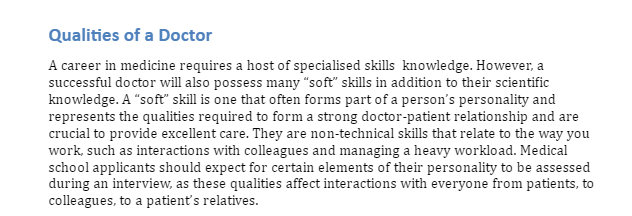
Lesson 2
Teamwork
As a doctor, you must be a strong team player. Individuals in various roles in the healthcare sector must collaborate in the best interests of the patient.

Lesson 3
Leadership
A doctor will regularly assume the leadership role of the healthcare team. While other healthcare professionals provide valuable expertise, a doctor is typically the final decision-maker in a patient’s care.

Lesson 4
Empathy
Medicine is widely perceived as both an art and a science, with your biomedical knowledge of the workings of the body being applied in a holistic manner that takes into account the social and emotional needs of that individual patient.

Lesson 5
Organisation
It is critical to stay organised and on top of the vast amount of work assigned during medical school and throughout a career in medicine.

Lesson 6
Strengths and Weaknesses
In previous chapters, we discussed how to approach questions about specific skills like teamwork, leadership, and empathy. Some questions, on the other hand, are more general and ask candidates to identify areas of strength and weakness in their own personality.

Lesson 7
Practice Questions: Personal Qualities & Skills
In this chapter, we will go through medicine interview practice questions!

Medical School
When you study medicine, you are committing to studying at a specific medical school for several years. Universities expect you to have made an informed decision not only about becoming a doctor, but also about which medical school you want to attend.
Tutorials
Lesson 1
Teaching Styles
You may have noticed that the teaching styles available at various medical schools differ. Before your interview, research the medical school’s curriculum and the types of courses they offer.

Lesson 2
Dissection and Prosection
During the pre-clinical phase of a medical degree, anatomy is taught. Anatomy is taught in a variety of ways, with surprising differences in teaching methods between UK medical schools.

Lesson 3
Practice Questions: Knowing the Medical School
In this chapter, we will go through medicine interview practice questions!

Core Knowledge
The National Health Service (NHS) is the United Kingdom’s publicly funded healthcare system. If you study medicine in the United Kingdom, you will complete all of your clinical rotations in NHS hospitals and general practises. As a result, during your medical school interviews, you will be expected to demonstrate an understanding of NHS values and basic structure.
Tutorials
Lesson 1
NHS Structure
The NHS is a large and complicated organisation that can be difficult to comprehend. It is made up of many different organisations with various roles and responsibilities.

Lesson 2
NHS Constitution
The NHS values were developed through consultation with patients, the general public, and staff members in order to express values that aim to underpin everything the NHS does.

Lesson 3
Training Pathways
Medical school is only the first step toward becoming a doctor. There are many different paths you can take, and training will differ depending on your interests.

Lesson 4
NHS Scotland
The NHS is a devolved system, which means that the healthcare systems in the four UK countries are distinct.

Lesson 5
Practice Questions: Core Knowledge
In this chapter, we will go through medicine interview practice questions!

Medical Ethics
In this chapter, we tackle the most difficult aspect of the interview: Medical Ethics. We assist you in incorporating terminology like the medical pillars and GMC Guidelines into your answers, as well as demonstrating how to approach common ethical scenarios like confidentiality, organ donation, and abortion.
Tutorials
Lesson 1
Pillars of Medical Ethics
Medical ethics has evolved significantly over the last century, largely as a result of significant legal cases. Despite the fluidity of ethical definitions, four core principles have remained at the heart of the profession.

Lesson 2
Confidentiality
Confidentiality is an extremely important concept to consider in both medical interviews and clinical practice, even though it is not one of the pillars of medical ethics.

Lesson 3
Consent and Capacity
To understand and apply consent and capacity rules in medical interviews, it is critical to first understand the distinction between the two terms.
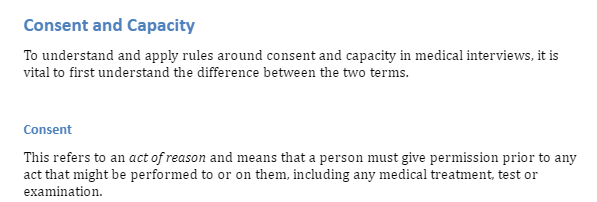
Lesson 4
Abortion
Abortions before 24 weeks of pregnancy are legal and safe in England, Scotland, and Wales under the Abortion Act. Abortions can be performed after 24 weeks in some cases, but the legalities are complicated and far beyond the scope of medical interviews.

Lesson 5
Organ Donation
Organ donation laws are extremely complex, region-specific, and constantly changing. Only a basic understanding of organ donation schemes and organ allocation is required for a medical school interview.

Lesson 6
NHS Hot Topics
In this chapter we discuss and debate the key NHS news topics from the past 12 months. It is important for you to be aware of common issues, and to be watching the news regularly.
Lesson 7
COVID-19
Everyone has an opinion on the subject, but how should you approach discussing the COVID-19 pandemic in medical school interviews? You will be expected to form opinions about the pandemic’s political and public health aspects, as well as the medical science.
Lesson 8
Brexit
It is 2019, and the United Kingdom has still not left the European Union. What will happen in the next few months is uncertain. What are the implications of a no-deal Brexit for the NHS? What impact will Brexit have on the NHS? How will it affect the workforce, many of whom are EU citizens? Will the NHS receive the £350 million proposed by Vote Leave? We will go over this extensively because it is likely that it will come up during your interview.
Lesson 9
Euthanasia
Lesson 10
Charlie Gard & Alfie Evans
Charlie, who was born with encephalomyopathy mitochondrial DNA depletion syndrome, is discussed in this chapter (MDDS). Charlie’s parents wanted him to have an experimental treatment called nucleoside bypass therapy (NBT), but Great Ormond Street Hospital (GOSH) determined that Charlie’s condition was too severe for this treatment to help, despite the fact that he was never treated with NBT. This sparked a national debate about autonomy and acting in the best interests of the patient, as well as international attention from the Pope and Donald Trump.
Lesson 11
Junior Doctor Contracts
This has been a hot topic for quite some time, and a new contract was finally agreed upon in 2019. What are the implications for junior doctors, and what were some of the stumbling blocks that caused the contract to take so long to finalise? How will this affect doctors’ working conditions, and did they get a better deal than before?
Lesson 12
Obesity Crisis
According to the UN Food and Agriculture Organization, one in every four British adults is obese – Britain has been dubbed the “fat man of Europe.” Obesity rates among children are at an all-time high, and many divisive policies have been implemented to combat it. The sugar tax is one example. The levy brings the UK into line with a small group of countries that have implemented similar taxes, including Mexico, France, and Norway.
Lesson 13
Ageing Population
In this chapter, we will go through the ageing population crisis!
Lesson 14
Privatisation
In this chapter, we will go through privatisation!
Lesson 15
Mental Health Crisis
In this chapter, we will go through mental health crisis!
Lesson 16
Vaccines
In this chapter, we will go through vaccines!
Lesson 17
A&E Waiting Times
There has been a significant increase in the number of patients who have had to wait more than 12 hours. The worst month on record for hospital A&E departments was January 2019, with more patients than ever waiting more than four hours to be seen. Estimates suggest that over 5000 additional beds will be required, but will there be enough money to fund this? There are also discussions about eliminating the 4-hour breach limit, which many believe does not account for many variables that are beyond the control of doctors.
Lesson 18
Practical Stations and Roleplay
In this chapter, we will go through medicine interview practice questions!
Lesson 19
7 Day NHS
Jeremy Hunt, the former health secretary, suggested that the NHS be properly staffed seven days a week after a report revealed that weekend mortality rates were higher. This caused an uproar in the medical community because services are currently provided as effectively on all seven days. General practice has become more of a 7-day service, with more convenient hours for all.
Lesson 20
Data Interpretation
In this chapter, we will go through medicine interview data interpretation!
Virtual Interviews
As a result of the COVID-19 pandemic, numerous universities were forced to reconsider their traditional admissions processes. This had an impact on medical interviews because they, by definition, did not adhere to the pandemic’s health and safety protocols. As you have learned, typical interviews take place in close quarters, with multiple interactions between people who have travelled long distances. As a result, virtual interviews became the norm at all UK medical schools to aid in the admissions process.
Tutorials
Lesson 1
Preparing for Virtual Interviews
Preparing for virtual interviews requires time, consistency, and careful consideration of the wide range of skills required to demonstrate your abilities on-screen rather than in-person. Remember that medical interviews are primarily used to assess a candidate’s personality and emotional intelligence, both of which can be difficult to demonstrate on a virtual platform.





